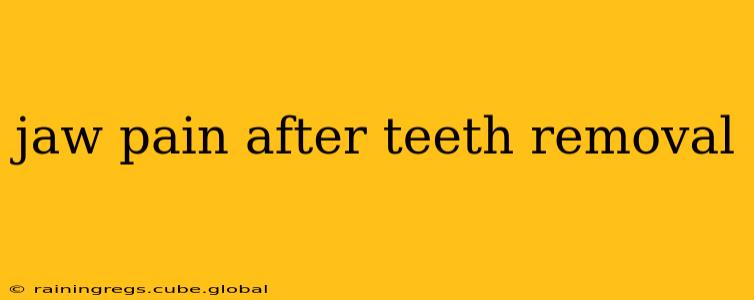Experiencing jaw pain after teeth removal is a common occurrence, but understanding its causes and how to manage it is crucial for a smooth recovery. This comprehensive guide will explore the various reasons behind post-extraction jaw pain, effective treatment options, and preventive measures you can take.
What Causes Jaw Pain After Tooth Extraction?
Several factors contribute to jaw pain following a tooth extraction. The most common include:
-
Inflammation and Swelling: The extraction site naturally swells as part of the healing process. This inflammation can put pressure on surrounding tissues and nerves, leading to jaw pain. The degree of swelling and pain varies depending on the complexity of the extraction.
-
Dry Socket (Alveolar Osteitis): This painful complication occurs when the blood clot at the extraction site dislodges or dissolves prematurely. The exposed bone is then directly exposed to air, food, and saliva, causing significant pain that often radiates to the jaw.
-
Infection: Although less common with proper post-operative care, infection can occur at the extraction site. This can lead to severe pain, swelling, and redness. In some cases, the infection may spread to the jaw.
-
Referred Pain: Pain originating from the extraction site can sometimes be felt in the jaw due to the complex network of nerves in the head and neck.
-
Sinus Issues (Upper Teeth Extractions): Extractions of upper teeth, particularly molars, can sometimes affect the maxillary sinus, leading to sinus pain that can feel like jaw pain.
-
Temporomandibular Joint (TMJ) Dysfunction: Pre-existing TMJ disorders can be exacerbated by the stress and trauma of tooth extraction, leading to increased jaw pain.
How Long Does Jaw Pain After Tooth Extraction Last?
The duration of jaw pain varies considerably depending on the individual, the complexity of the extraction, and the presence of complications. Mild discomfort typically subsides within a few days, while more severe pain, especially related to dry socket or infection, may persist for a longer period. Most patients experience a significant reduction in pain within a week, but complete healing can take several weeks.
What Can I Do to Relieve Jaw Pain After Tooth Extraction?
Several home remedies and medical treatments can help manage jaw pain after tooth extraction:
-
Over-the-Counter Pain Relievers: Ibuprofen or acetaminophen can effectively reduce pain and inflammation. Always follow the recommended dosage.
-
Ice Packs: Applying ice packs to the affected area for 15-20 minutes at a time can help reduce swelling and numb the pain.
-
Rest: Adequate rest is crucial for healing. Avoid strenuous activities and excessive talking.
-
Soft Foods: Stick to soft, bland foods that are easy to chew and won't irritate the extraction site.
-
Saltwater Rinses: Gentle saltwater rinses can help keep the area clean and prevent infection.
-
Prescription Medication: Your dentist may prescribe stronger pain relievers or antibiotics if necessary.
Can I Exercise After Tooth Extraction?
Gentle exercise is usually fine after a tooth extraction, but you should avoid strenuous activity that could increase blood pressure and potentially dislodge the blood clot. Consult your dentist for specific recommendations based on your individual situation. Avoid activities that put excessive stress on your jaw.
What Should I Do If I Have Severe Jaw Pain?
Severe jaw pain, particularly if accompanied by fever, excessive swelling, or signs of infection, warrants immediate medical attention. Contact your dentist or oral surgeon immediately.
How Can I Prevent Jaw Pain After Tooth Extraction?
Following your dentist's post-operative instructions carefully is crucial for preventing complications and minimizing jaw pain. This includes:
-
Careful Post-Operative Care: Following instructions regarding medication, rinsing, and diet is vital.
-
Avoiding Smoking and Alcohol: These habits can hinder healing and increase the risk of dry socket.
By understanding the potential causes of jaw pain after tooth extraction, implementing effective treatment strategies, and following preventive measures, you can ensure a smoother and less painful recovery. Remember to always consult your dentist or oral surgeon for any concerns or complications.
